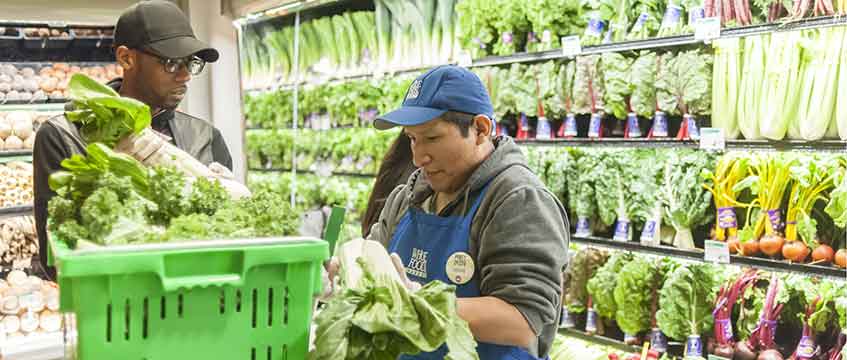Amazon stocks up on Whole Foods stores
E-commerce giant Amazon’s $13.7bn (£10.7bn) acquisition of grocer Whole Foods signals the e-tailer’s commitment to bricks and mortar and could prompt further consolidation in the UK grocery market.
“It is a massive market and they want to go after it,” says Allan Lockhart, property director, New RiverRetail. “This shows that the narrative around the death of bricks and mortar retailing is not correct. If it was not so essential to Amazon, why would they spend nearly $14bn in cash on a grocery retailer?”
The initial impact to the UK property market will be minimal. In the US it will give Amazon control of Whole Food’s portfolio of 450 shops, which it can use as distribution and collection hubs.
E-commerce giant Amazon’s $13.7bn (£10.7bn) acquisition of grocer Whole Foods signals the e-tailer’s commitment to bricks and mortar and could prompt further consolidation in the UK grocery market.
“It is a massive market and they want to go after it,” says Allan Lockhart, property director, New RiverRetail. “This shows that the narrative around the death of bricks and mortar retailing is not correct. If it was not so essential to Amazon, why would they spend nearly $14bn in cash on a grocery retailer?”
The initial impact to the UK property market will be minimal. In the US it will give Amazon control of Whole Food’s portfolio of 450 shops, which it can use as distribution and collection hubs.
The UK Whole Foods portfolio will boost Amazon’s grocery business in and around central London, but if it wants to increase operations on a country wide basis, it will need to acquire more distribution space and shops.
If the merger is successful in the US, Amazon may consider buying a UK grocer to facilitate these sorts of acquisitions.
Property implications
Kevin Mofid, commercial research director, Savills, says: “The property implications for the UK are a couple of years down the line. It is possible that they may look to acquire a bricks-and-mortar grocery retailer in the UK, and that’s when it will be interesting – they will require more warehouse space. In America, the portfolio will become Amazon Fresh collection points, which will allow the model to evolve much faster.”
James Watson, head of retail capital markets, Colliers International, adds: “The acquisition will also give Amazon outlets through the handful of Whole Foods stores in this country, but more importantly, it may be a precursor for a corporate move on a more major UK food store operator.”
Whole Foods only has nine shops in the UK and bases its operations from a 12,000 sq ft warehouse in Waltham Cross, Hertfordshire. Its supply chain is outsourced to UK firm Stubbins.The portfolio is focused on affluent catchments of central London, which is also where Amazon operates best.
Amazon will most likely use the portfolio to its advantage as both distribution centres and collection hubs.
In the US, most of Whole Foods’ shops are around 50,000 sq ft. The acquisition will position Amazon at the forefront of the online grocery sector.
Whole Food’s space and brand is targeted at an affluent demographic and has a higher price point than other UK supermarkets such as Sainsbury’s or Tesco.
“If Amazon wants to stay true to the Whole Food brands and ethos, it may be limited in what it can do as Whole Food’s price point is expensive,” says Lockhart.
The move will also give Amazon the upper hand on one of its largest rivals in the US, Walmart. Although Amazon has already showed interest in physical space with bookshops and the Amazon Go format, which is due to open later this year, it does not yet have a physical platform that is large enough to take on the competition.
A weapon against Walmart
“It is a reaction to the threat of Walmart,” says Lockhart. “This is all about giving Amazon the platform it needs to be able to compete with Walmart more effectively.”
Walmart’s strategy includes offering online promotions that can be redeemed when items are collected in store, which cuts the cost of last-mile distribution and boosts in-store sales. By using the Whole Foods store network, Amazon will similarly be able to cut the cost of last-mile distribution.
Amazon has already partnered with Morrisons in its Amazon Fresh tie-up, which it launched last year, but Morrisons acts only as a supplier and Amazon does not have access to its portfolio.
“It is obviously a statement of intent in grocery retail,” says Mofid. “I can’t see how the store network Whole Foods has in the UK could allow it to be the sole Amazon fresh supplier. I think we will see more acquisitions by Amazon in the UK and Europe.
“Morrisons already supplies Amazon Fresh in the UK, so that could be an interesting tie-up and would be huge. If the grocery sector wasn’t taking Amazon seriously before, then it should now.”
To send feedback, e-mail amber.rolt@egi.co.uk or tweet @AmberRoltEG or @estatesgazette











